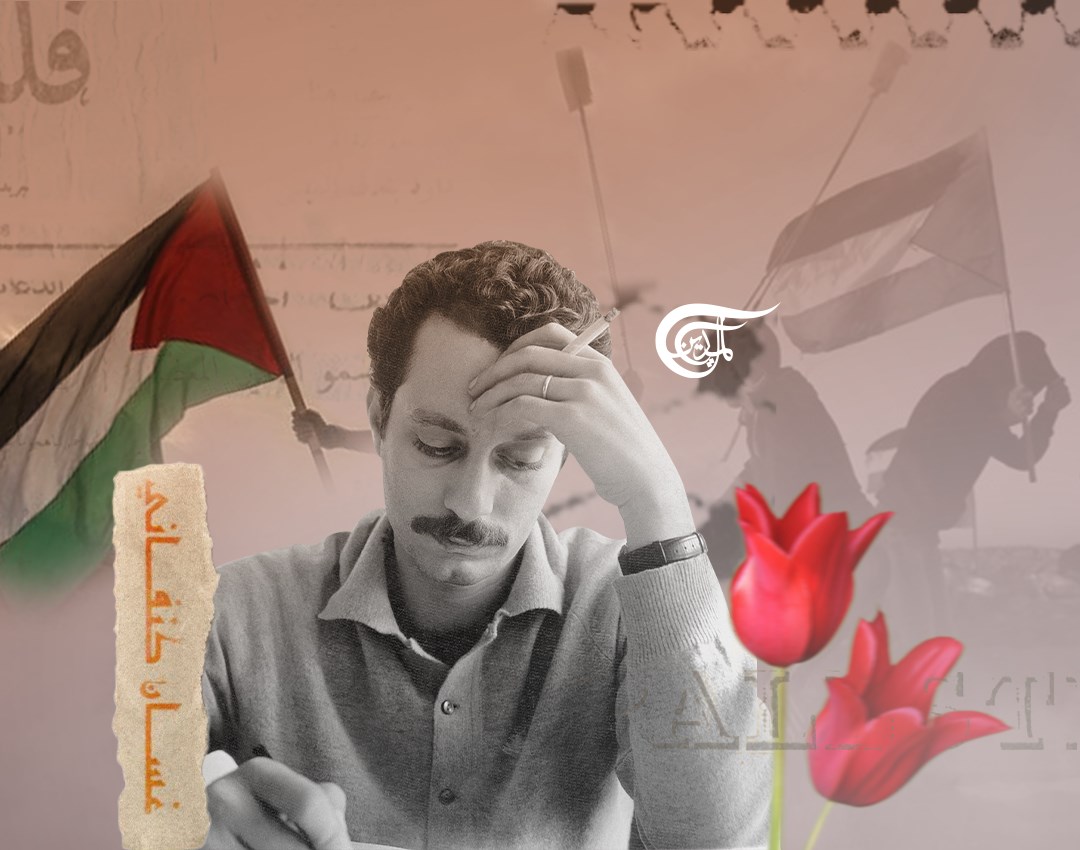Ghassan Kanafani’s Legacy Paves The Way Towards A New Revolutionary Trend
Ghassan Kanafani brought the Palestinian cause to the world, not simply refining it to its seemingly small geographic confines.
-

Ghassan Kanafani’s Legacy Paves The Way Towards A New Revolutionary Trend
It has now been 50 years since the assassination of the revolutionary Palestinian icon, Ghassan Kanafani, who was assassinated in Beirut, in a brutal car bombing orchestrated by Mossad agents in 1972. Immortalized for his refusal to concede his principles to the Zionist terror, it is argued that today more than ever the example set by Kanafani is inspiring a young generation of Palestinians universally.
Ghassan Kanafani was a Palestinian revolutionary, often known for his role as a spokesperson for the Marxist resistance movement called the Popular Front for the Liberation of Palestine (PFLP). Along with the iconic Palestinian poet Mahmoud Darwish, Kanafani remains among the most influential of Palestinian writers in modern Arabic literature. Ghassan Kanafani was also an important transformative force in Middle East journalism. Cementing his place in history through his introduction of unique and innovative communication techniques, he was well known for his leading role in the creation of a number of regional newspapers and magazines, most prominently, the PFLP-aligned weekly, Al-Hadaf.
Although his physical life may have ended at the early age of 36, Ghassan Kanafani’s literary work was preserved and, due to it being made widely accessible for posterity, has led a life of its own since his death. Born prior to the formation of the Zionist entity and having been the victim of ethnic cleansing, along with his family, from Akka, in 1948, Kanafani offered a unique incite into Palestinian revolutionary thought and still, until this day, represents a powerful voice in opposition to corruption, imperialism, colonialism and beyond. Ghassan Kanafani brought the Palestinian cause to the world, not simply refining it to its seemingly small geographic confines, famously stating that "the Palestinian cause is not a cause for Palestinians only, but a cause for every revolutionary… as a cause of the exploited and oppressed masses in our era."
According to Omar Zahzah, a Palestinian poet, writer, and independent scholar, “Kanafani embodied and enacted a fierce convergence between activism, creativity, and literary artistry. He taught all of us that resistance is, at its root, a deeply creative, even intellectual endeavor, and that the cultural workers in a movement have a duty to channel the struggle through their efforts.”
I asked Zahzah to what extent Ghassan Kanafani’s legacy has taken effect on his outlook and perspectives on the Palestinian struggle through media today, as someone born after the death of Kanafani. He replied, “Ghassan Kanafani has greatly shaped my outlook and perspective on the struggle through media, journalism, literature, and culture more broadly. Kanafani showed the world that words can be the ultimate weapons of the masses resisting imperialism, colonialism and settler-colonialism by inspiring us all to challenge the logic and repressive natures of dominant systems and by giving people hope that even the seemingly mightiest oppressive states can fall, must fall, when challenged by the righteous resistance of a people vying for total liberation. What Kanafani did was fuse the act of writing within the wider rubric of anti-colonial resistance. He showed us all that literature and journalism can be from, of, and, ultimately, *for* the people, rather than the elite.”
Omar Zahzah believes that “paradoxically… Israel’s assassination policy proved how weak, fragile, and ultimately worthless the colonial Israeli state really is. They thought they could silence Kanafani by assassinating him because, as a racist, settler-colonial state, the only language Israel understands or operates through is violence.” He says that through the assassination of Kanafani, on July 8, 1972, "Israel" proved that “it has not one iota of equality, love, justice, or egalitarianism within its very symbolic constitution—nothing but ruthless racism and colonial hierarchies of humanity.” He also went on to say that “the assassination of Kanafani turned him into a martyr, and even more: it showed that the words of the Palestinian people are enough to stir and inspire resistance until liberation. The very fact that the Zionist state felt it had no choice but to liquidate such a powerful intellectual Palestinian giant proves how morally bankrupt and weak the Israeli state is, and has always been.”
I also asked Omar Zahzah whether we could draw any parallels between Ghassan Kanafani’s assassination and "Tel Aviv’s" policies in 2022, of targeting Palestinian journalists, specifically asking about the assassination of veteran Al-Jazeera journalist, Shireen Abu Akleh. He responded with the following:
“Certainly. The case of Shireen Abu Akleh has achieved international prominence—and this is a good thing. But in fact, the Zionist state executes Palestinian journalists and media workers with impunity. Since 2000, the Israeli state has slaughtered nearly 50 Palestinian journalists. This is by no means a new phenomenon. It actually makes perfect sense, in a sick, cynical fashion: journalists and writers, those who bear witness to the Zionist entity’s violence and show it to the world, helping other Palestinians not only to make sense of it but also find the courage, morale, and resolve to continue resisting and speaking out against their unjust oppression. They are the natural enemies of the Israeli state, precisely because the more Israel’s ongoing genocide of the Palestinian people is scrutinized, questioned, and challenged, the greater the blow to the Zionist state’s impunity is. Of course, this impunity is still very well entrenched, thanks to Israel’s 'special relationship' with the United States, another white supremacist, militarized settler-colony, but over the years, Palestinians’ relentless efforts have nevertheless managed to strike important blows to the Zionist state’s false image as a so-called success of anti-racism. People are becoming increasingly aware of how perverted Israeli PR really is in disguising racist settler-colonialism and apartheid as a 'liberation' movement. Now it’s becoming clearer and clearer that Israel is nothing but a settler-colonial apartheid state that kills with impunity and weaponizes accusations of 'terrorism' and 'antisemitism' to hide its crimes, and Palestinian writers and journalists have played a large role in this growing consciousness.”
Why is it that Kanafani is still capable of reaching the Palestinian youth of today through his works; I asked Zahzah?
“Kanafani was an unapologetic proponent of revolution and liberation. He was someone without pretension, someone who honed his gift for words toward complete collective betterment and support. In this way, he remains as vibrant a figure as ever to the newer generations who are increasingly rejecting the paradigm of the so-called “Peace Process", the Oslo Accords, far more so than the corrupt bureaucrats who keep the struggle on behalf of their own self-interest. Kanafani remains a symbolic antidote to the self-interest, betrayal, and neo-liberalization of the Palestinian struggle, someone who shows us that another example, other, more egalitarian forms of devotion, to people and to struggle, are urgently possible.”
He continued, “What is incredible about every aspect of Kanafani’s work is how much it all seems to brim with his ethical and political convictions. I can read a short story like 'The Land of Sad Oranges,' a stirring account of sacrifice such as 'Letter from Gaza,' or a novella like 'Men In the Sun' and, while they don’t necessarily provide easy, direct answers, they nevertheless bristle with the larger current of a collective *Palestinian* experience, which in and of itself necessitates a greater coming into consciousness and resultant political resolve.”
“But over the years, I’ve found myself particularly stirred by Kanafani’s criticism, from his study of the 1936 uprisings to his satirical literary reviews written under pseudonyms such as Faris Faris, to his study on Zionist literature,” Zahzah says. “Part of Kanafani’s genius is his ability to name and identify a larger Palestinian experience. He matched this with a sophisticated and piercing understanding of the role of literature both in liberation and colonization. This is what I feel sets Kanafani apart from so many: he looked at the role of aesthetics and ideas as they are, have been, or can be mobilized within political movements. He showed us that Zionism began as a literary movement before it became a political one and that once it assumed the latter form, it drew heavily from its earlier incarnation. But he also understood how literature can galvanize a whole people—and he applied this knowledge relentlessly, up until the very end.”
One of the mottoes at the weekly magazine, Al-Hadaf, to which Ghassan Kanafani was its chief editor, was that “the truth is always revolutionary." In the contemporary era, the works of Kanafani stand as a testament to how the truths he communicated have also become immortal and that his martyrdom on the path toward justice only encouraged others to pick up the torch, or in his case pen, of revolution.

 Robert Inlakesh
Robert Inlakesh
 8 Min Read
8 Min Read











